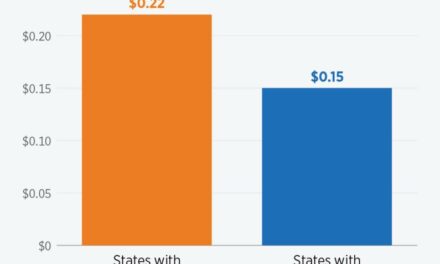We support our Publishers and Content Creators. You can view this story on their website by CLICKING HERE.

Editor’s note: This is a lightly edited transcript of the accompanying video from professor Peter St. Onge.
Is college still worth it? According to Newsweek, millions of Americans are just saying “no.”
Why? Because, according to a new poll, many see universities as a place where political agendas replace useful skills, and they walk away with $300,000 in debt that cripples them for life.
In fact, college enrollment is down 2.5 million since COVID-19, while the share of 18- to 26-year-olds working in the trades has gone from 25% pre-pandemic to 31% today.
Meanwhile, a recent Gallup survey found only a third of Americans—of all ages—say they have confidence in universities: 32% said they have little or no faith. That’s a big drop from just a decade ago, when 57% had faith and just 10% did not.
Of those who lost faith, 41% said liberal indoctrination has taken over, while 37% said college doesn’t teach relevant skills. The rest cited the cost.
According to Gallup, at this point, 46% of parents would actually prefer their kids not go to college—instead getting a job, pursuing vocational training, or starting a business.
Even companies are skipping college students: According to a survey by college-prep company Intelligent, 1 in 3 companies have eliminated bachelor of arts requirements for entry and even midlevel jobs. A survey from New America found that 63% of Gen Z thinks there are plenty of jobs without college degrees.
So, why do people still go to universities? Aside from the beer, the main selling point has been income. College grads have historically made about $30,000 more than high school grads.
But George Mason University economics professor Bryan Caplan has written a book arguing that almost all of those wage gains have nothing to do with the education.
About half is the fact that smart, hardworking kids go to college in the first place. It’s the smarts and the hard work that makes the money, and college was actually in the way.
I mentioned in a recent video how companies used to solve this with aptitude tests, but those were declared discriminatory, so now a $50 competency test is replaced with a $300,000 degree.
The other half of the wage premium, according to Caplan, is essentially a signal to employers that you’re willing to put up with four years of tedious bull****. It’s essentially a grit meter.
Caplan guesses that, controlling for those, the actual premium of a college degree is around $5,000 per year. Which wouldn’t come close to justifying the $300,000 price of a degree—plus four years of lost wages and experience.
Note that if almost the entire college wage premium is sorting and grit, you could get rid of everything but the admissions committee, toss in some random challenge like running a half-marathon, and call it a day.
So, what’s next?
The fact that college is useless won’t matter for public spending given that—useless or not—universities are a $700 billion industry swimming in $250 billion of taxpayer money.
It’s a racket, sure, but it pays politicians back tenfold—partly by indoctrinating of future voters. College generally swings you Democrat by about 13 points. Even more important are the reams of biased academic studies that promote global warming, institutional racism, world socialism, or the odd experimental vaccine.
As for parents, most will sleepwalk their kids into debt slavery. And, to be fair, college is useful if you go to a top school. Universities have, after all, seized the gates to the status hierarchy.
But for the typical student at the typical university, other than fields like medicine or engineering, they should probably drop out, save their money, and either learn a trade or start a business.
We publish a variety of perspectives. Nothing written here is to be construed as representing the views of The Daily Signal.

 Conservative
Conservative  Search
Search Trending
Trending Current News
Current News 





